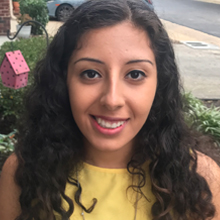
“Never before had I experienced an international program such as YYGS that promoted
diversity as a source of pride and connection. Cultural background is not celebrated as a source of strength in my school system, so I have always felt a need to conform myself to be more uniform in American society. YYGS is one of the very few programs in the United States that encourages you to stop trying to fit into a community and to instead allow the community to fit you.
Upon introducing myself as an Iraqi American, every single member of the YYGS community greeted me with open arms and an open heart. My heritage and experiences as an American Muslim were used as a point of conversation, comparison with others and as an educational opportunity for many. Cooperation, tolerance, and respect trickled into the veins of YYGS with every cross-cultural conversation.”

One young woman told me that she wanted her daughter to be as well educated as I appeared to be. Another told me that she simply hopes to pull her family out of poverty. Teenage pregnancy is a worldwide phenomenon, but it particularly affects single mothers in rural areas, such as those women in San Juan Del Sur, Nicaragua. Much research, however, only focuses on the prevention of teenage pregnancy in Nicaragua. As a Sister Cities Youth Ambassador, I received the opportunity to pursue this area of research by visiting a school built by a Virginia Beach Sister Cities Board member. When I went down to Nicaragua as a research intern, I came with one main purpose: to challenge previous research and funding allocation that repeatedly tried to prevent teenage pregnancy instead of suggesting solutions to navigate it. Female empowerment has always been an important principle for me, but the element of motherhood was personal because of my own mother, whose hard work I always admired.
After arriving at the school, I conducted thirteen semi-structured interviews with teenage mothers in the process of attaining their education as well as an administrative interview with the Rectorate, who could speak to the success of past graduates who were teenage mothers. My ethnographic study allowed me to finally have insight into these mothers’ lives,
educational progress, and professional aspirations, which was essential in understanding the role of education in the lives of teenage Nicaraguan mothers.
As my IB extended essay and AP Research paper assert, education should be made readily available to Nicaraguan teenage mothers because of the professional opportunities that follow. Such a movement could harness the social prestige of motherhood to create social acceptance for teenage mothers as professionals. In addition to this, my research asserts that a professional social shift may encourage greater feminine political participation, leading to the prioritization of the women’s rights agenda in Nicaragua. Overall, education provides social mobility for teenage mothers in Nicaragua.